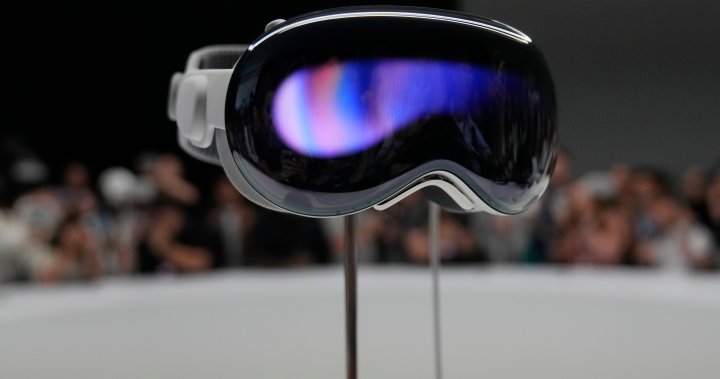
Apple’s Vision Pro mixed reality headset is here — for just US$3,500
Global News
After years of speculation, Apple CEO Tim Cook hailed the arrival of the sleek goggles -- dubbed ``Vision Pro'' -- at the company's annual developers conference.
Apple on Monday unveiled a long-rumored headset that will place its users between the virtual and real world, while also testing the technology trendsetter’s ability to popularize new-fangled devices after others failed to capture the public’s imagination.
After years of speculation, Apple CEO Tim Cook hailed the arrival of the sleek goggles — dubbed “Vision Pro” — at the company’s annual developers conference held on a park-like campus in Cupertino, California, that Apple’s late co-founder Steve Jobs helped design.
“This marks the beginning of a journey that will bring a new dimension to powerful personal technology,” Cook told the crowd. Apple didn’t immediately reveal the goggles’ price, although they are expected to cost in the $3,000 range, likely limiting their appeal to a fairly narrow band of video-game enthusiasts and affluent technophiles.
The headset could become another milestone in Apple’s lore of releasing game-changing technology, even though the company hasn’t always been the first to try its hand at making a particular device.
Apple’s lineage of breakthroughs date back to a bow-tied Jobs peddling the first Mac in 1984 — a tradition that continued with the iPod in 2001, the iPhone in 2007, the iPad in 2010, the Apple Watch in 2014 and its AirPods in 2016.
The company emphasized that it drew upon its past decades of product design during the years it spent working on the Vision Pro, which Apple said involved more than 5,000 different patents. The goggles will be equipped with 12 cameras, six microphones and variety of sensors that will allow users to control it and various apps with just their eyes and hands. Apple also developed a technology to create three-dimensional digital version of each user to display during video conferencing.
If the new device turns out to be a niche product, it would leave Apple in the same bind as other major tech companies and startups that have tried selling headsets or glasses equipped with technology that either thrusts people into artificial worlds or projects digital images with scenery and things that are actually in front of them — a format known as “augmented reality.”
Facebook founder Mark Zuckerberg has been describing these alternate three-dimensional realities as the “metaverse.” It’s a geeky concept that he tried to push into the mainstream by changing the name of his social networking company to Meta Platforms in 2021 and then pouring billions of dollars into improving the virtual technology.












